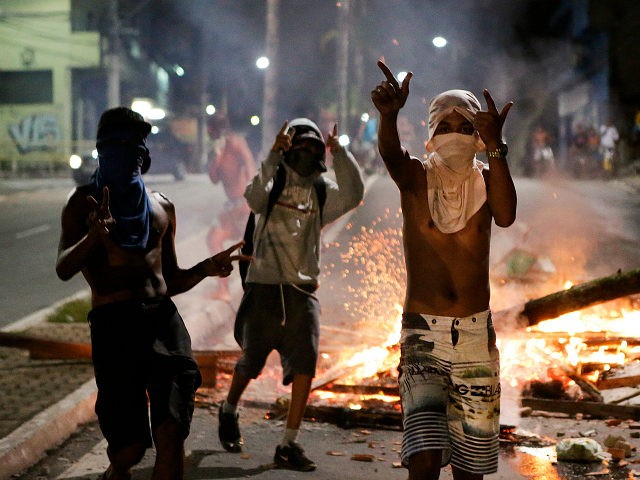Protests preventing police from leaving their barracks have led to an astronomical spike in homicides, looting, and other violent crime in Espirito Santo, Brazil, north of Rio de Janeiro.
Schools have canceled classes and many residents refuse to leave their homes, as police are no longer patrolling the streets. The state’s capital has recorded 52 homicides in three days, a 650-percent increase, according to the Daily Mail. The Civil Police Union has estimated that incidents of homicide and property crime have soared 1000 percent since the strike began.
The Brazilian newspaper Folha de Sao Paulo reported “homicides, looting, interruption in classes, a paralysis of public transportation, and larceny at stores in [the state capital].” Thugs burned at least two public transportation buses, and health centers have closed, exacerbating a growing yellow fever epidemic in the middle of Brazil’s humid summer. As many choose not to risk leaving the house, the capital’s streets remain largely empty.
Officials in Brasilia announced they would send over 1,000 soldiers and national guard officers to replace the Military Police members not currently working. The situation remains tense in the coastal state, however.
Relatives of police officers began to strike in front of the Military Police barracks on Friday, blocking the exits for police cars. Brazil bans officers from going on strike due to the nature of their jobs; their wives say they have taken up the protest in their stead. Speaking to BBC, a representative of the Military Police (PM) Family Movement who did not give her full name explained that they were demanding improved working conditions and salaries for their husbands. “We don’t have any because they don’t fit in our budget,” she told a BBC reporter when asked if the couple had children.
“Our police earn around R $2,640 ($847.09) [monthly], but the national average is $1279.94,” Civil Police Union Humberto Mileip told BBC. “Our military police are starving. It is no use for the government to preach that Espirito Santo is employing fiscal austerity while the policeman is sacrificed.”
Protesters insist that they organized their blockade of police barracks independent from police officers, who could face up to two years in prison for refusing to do their jobs.
“What is happening in Espirito Santo is open extortion,” Governor Paulo Hartung said on Wednesday. “It is the same thing as kidnapping citizens and asking for ransom. Ransom cannot be paid, neither for ethical reasons nor without violating the Fiscal Responsibility law.”
The government has announced that it will cease to negotiate terms of labor with the police until the protests end and order is restored to the state. State officials have also filed a lawsuit against protesters to decree such protests illegal, possibly fearing that Military Police officers elsewhere in Brazil would take on a similar protest. Officials have also announced investigations into individual police officers to confirm that they did not incite the strike.
The protests are yet another public relations disaster for Brazil’s law enforcement. 2017 began with a bloody prison riot in northern Manaus, Amazonas state, where rival gang members beheaded and dismembered each other, and over one hundred inmates escaped (most remain at large). The Manaus riot led to a retaliatory attack in western Rio Grande do Norte state, where members of the Red Command (CV) drug gang skewered the flesh of rival First Capital Command (PCC) members and “barbecued” it on a stick inside their prison facility.
Justice Minister Alexandre de Moraes repeatedly denied that those involved in the multiple riots were members of drug gangs, and claimed the situation was “not out of control.”
Last week, President Michel Temer nominated de Moraes to a position on Brazil’s Supreme Court.

COMMENTS
Please let us know if you're having issues with commenting.